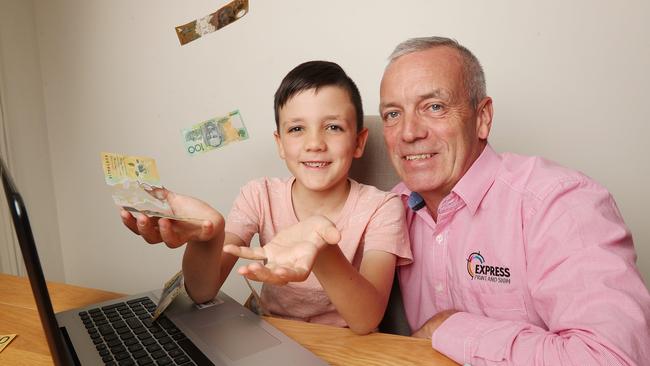Investing with children gets easier, but beware of the tax traps
Giving kids an early start in the world of stockmarket investing can help set them up for life. Here’s what you need to know.
A new wave of shareholders is emerging across Australia, and they’re much newer than you might think.
Parents and grandparents are helping children become stockmarket investors, providing an ultra-early financial education, but they are being warned to beware of potential tax traps and other issues.
Some kids as young as five own shares, and a survey of 1033 parents by Finder has found that 7 per cent of children aged under 12 – equating to 270,000 nationally – have a share trading account in their name.
Among them is Sam Reavley, 7, whose father Adrian recently opened a SelfWealth minor account for him to start investing in a Vanguard international shares exchange traded fund (ETF).
Adrian Reavley said it was the start of his son’s wealth journey and “we want him to be able to be financially independent as soon as possible”.

“There are some good lessons to be learnt such as understanding the value of compounding interest,” he said.
“Sam is only seven but he is getting a good knowledge base for future investments.”
Trading platform SelfWealth’s CEO, Cath Whitaker, says children can begin investing as soon as they can count, earn pocket money and comprehend saving rather than spending everything.
“I’ve taken the decision that a good age is five,” says Whittaker, whose has children aged eight and five.
“Financial literacy is not taught at schools, and concepts such as cumulative growth, long term gains, and contributing every month to an asset type will reap huge benefits when the child comes of age,” she says.
Children will also learn about dividends and sharemarket volatility, Whittaker says,
However, parents need to understand the tax issues.
Finder investment spokeswoman Kylie Purcell says people must be 18 or older to buy and sell shares, but accounts can be opened by adults under a child’s name. The tax treatment varies depending on whose tax file number is associated with the child’s account.
“Children can only earn $416 per financial year tax-free,” Purcell says.
“Once you exceed this you can be hit with hefty tax rates as high as 66 per cent.”
Talking to an accountant might help prevent future tax problems, Purcell says.
A total share investment of about $10,000 potentially produces more than $400 of annual income, and that would push a child into the 66 per cent tax rate.
Online stockbroker CommSec says people can open a trust account in the name of an adult who will act as trustee until the child turns 18, when the shares can then be transferred to an account in their name through an off-market transfer costing $54 per stock.
Catapult Wealth director Tony Catt says some parents invest in their own name and segregate it for their child, or invest through a family trust, but both options won’t give children a true feeling of ownership.
Catt says parents can also consider micro-investment platforms such as Raiz, which link regular savings to investment in ETFs, or can set up a pretend portfolio so children can see how money moves around. The Australian Securities Exchange facilitates this online through its sharemarket game and schools sharemarket game.
Children should be taught about investing for the long-term, rather than develop a short-term trading mindset, Catt says.
“It can be a dangerous mentality when it’s seen as a casino rather than investing,” he says.

KNOW THE RULES
• The first $416 of annual income for a child is tax-free, but the tax rate rises to 66 per cent for income between $416 and $1307, and 45 per cent for income above $1307.
• A person under 18 can’t technically open a share trading account, but a trust account in the name of the adult can be opened on behalf of the child, with the shares transferred when they turn 18.
• Capital gains tax may apply when transferring the shares later, but this will depend on whose tax file number is linked to the minor account.
• Parents should seek professional tax advice.







To join the conversation, please log in. Don't have an account? Register
Join the conversation, you are commenting as Logout